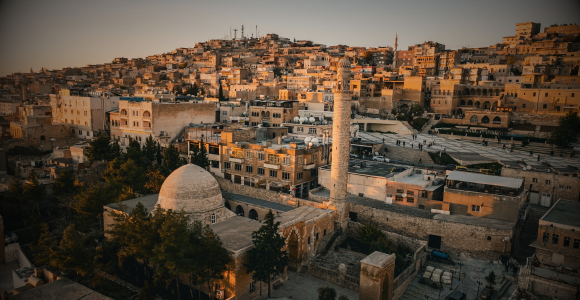
Consider how Robert Romero describes Galileans in his book Brown Church:
“As the Brown Church, we take solace in knowing that Jesus, our Lord, was also Brown. As a working class, young adult, Jewish man living in the colonized territory of Galilee, he also occupied a space of social, political, cultural, and religious liminality. Geographically, Galilee was a borderlands region where Jewish, Greek, and Roman worlds collided. As a sign of their cultural mestizaje, Galileans like Jesus spoke with an accent and were bilingual. Politically, they were ruled by the Roman Empire, subject to oppressive tribute, and dehumanized by imperial laws that made them second class citizens in their own historic land. Even among his own people, Jesus and other Galilean Jews were looked down as jíbaro, as backwards campesinos, who lived far from the center of religious and economic power in the capital of Jerusalem. When God chose to dwell among us, to take on human flesh, and to make our suffering his own, he chose to be Brown.” (Robert Chao Romero, Brown Church: Five Centuries of Latina/o Social Justice, Theology, and Identity, p. 16)
Welcome Readers! Please subscribe to Social Jesus Here.
This is Part 2 of The Gerasenes and the Current Migrant Crisis
(Read this series from its beginning here.)
The Galileans we encounter this week were also pig farmers. This has produced a challenge for certain interpreters today since the Hebrew people considered pigs to be unclean and farming them seems out of place. Yet, when taken with how Galileans were viewed by other regions of Judea, pig farming becomes a bit more plausible. Galilean pig farming could have been big business to their Gentile customers. It could indicate their hybrid interpretations of Torah fidelity or a lack of Torah fidelity altogether.
I have written in other places about how demon possession and specifically the name “legion,” was used in the gospels as a symbol for Roman occupation (possession) of the land (see Exorcism of a Man with an Unclean Spirit). Just as studies on on the impact of colonialism on the mental health of Indigenous people show psychological abnormalities and self harm are a significant, well-documented issue, imperialism and colonialism, both, also affected the mental health of subjugated people. Colonial practices and attitudes led to various forms of mental illness and psychological distress, and colonizers have sometimes interpreted or pathologized these experiences in ways that align with their own cultural understandings, including their beliefs about “demon possession.” Exorcism in the gospels therefore had a much more subversive, political meaning than our post-Enlightenment readings of these ancient stories reveal.
William Herzog reminds us what life was like for those in Galilee living under the combined oppression (possession) of both Rome and Herod:
“The peasant village in Palestine during the early decades of the first century was under increasing stress. The cumulative effects of Herodian rule combined with the rigors of Roman colonialism and the demands of the Temple hierarchy had taken their toll.” (William R. Herzog II, Parables as Subversive Speech: Jesus as Pedagogue of the Oppressed, p. 296)
And there is another layer to this story as well. We’ll wrap up with that and its applciation to the crisis in our migrant communities presently in U.S., in Part 3.
Are you receiving all of RHM’s free resources each week?
Begin each day being inspired toward love, compassion, justice and action. Free.
Sign up at HERE.














